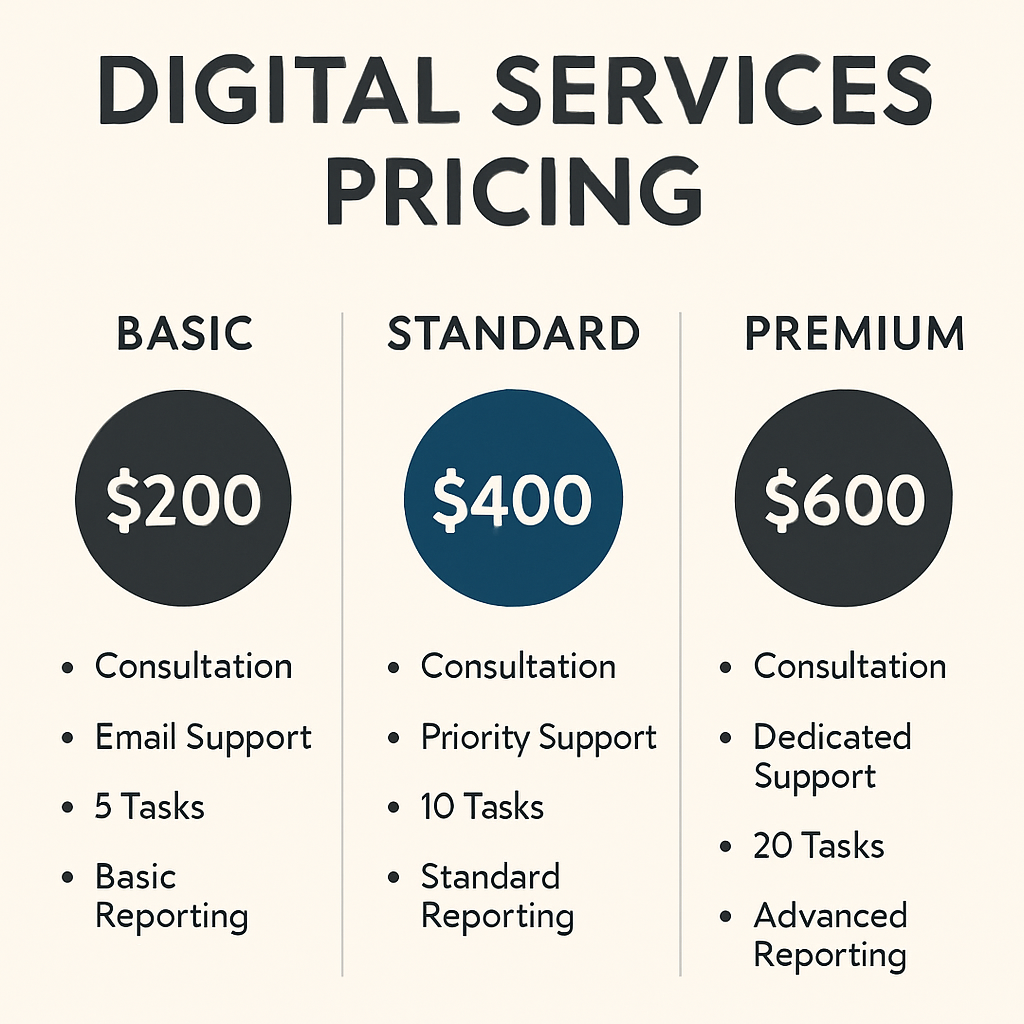Digital services consulting business opportunities are surging. In 2025, the digital transformation consulting market reached $383.33 billion. By 2033, it is projected to climb to $896.21 billion—an 11.2% CAGR. This growth enables professionals to launch or scale a profitable digital services consulting business. They can offer expert guidance in AI, cloud computing, analytics, and more.
Moreover, the shift to digital-first business models has transformed operations across industries. Consequently, demand for consultants who navigate complex technology implementations has never been higher. From AI deployments to digital marketing strategies, organizations urgently need specialized digital services. As a result, now is the ideal time to start or expand a digital services consulting business.
Understanding the Digital Services and Consulting Landscape
The Digital Revolution in Business
Digital services consulting covers a wide array of professional offerings, from technical implementation to strategic guidance. Digital transformation consulting helps organizations integrate technologies into their operations. It alters how they function and deliver value. Consultants may implement cloud computing, artificial intelligence, big data analytics, IoT, or blockchain. These technologies enhance processes, improve customer experiences, and create new business models.
The consulting industry has transformed dramatically. Digital transformation consulting has become the fastest-growing segment, expanding at a 28.5% CAGR. Businesses are rushing to adopt AI, automation, and cloud technologies. This surge in demand reflects a need for specialized expertise in technology, sustainability, and leadership development. As a result, consulting remains one of the most versatile and in-demand industries worldwide.
Market Opportunities and Growth Drivers
Several key factors drive the explosive growth in digital services and consulting:
Technology Adoption Acceleration: The rapid pace of technological advancement necessitates continuous adaptation, with consulting firms helping businesses stay updated with the latest innovations. Companies face increasing pressure to remain competitive through digital strategies, relying on consultants’ expertise to gain strategic advantages.
Skills Gap and Expertise Demand: Research shows that 60% of British business leaders concede urgent tech upgrades are needed to remain competitive, creating significant demand for external expertise. Organizations often lack the internal capabilities to implement complex digital transformations, making external consultants essential for success.
Competitive Pressure: Modern customers demand seamless and personalized digital experiences, pushing businesses to seek consulting services for designing and implementing systems that meet these high expectations. The rise in competition drives companies to adopt cutting-edge digital strategies to maintain market position.
Cost Efficiency: Digital transformation often results in cost reductions and productivity enhancements, with consultants helping identify areas for technological improvement to optimize performance. This creates a strong return on investment case for hiring specialized consultants.
High-Demand Digital Services Niches

Digital Transformation and Strategy Consulting
Digital transformation consulting represents the most lucrative segment of the digital services market. The global digital transformation consulting market was valued at $77.52 billion in 2024 and is expected to reach $245.59 billion by 2033. This massive growth reflects the critical need for expert guidance in navigating complex technological changes.
Key areas within digital transformation consulting include:
Strategic Digital Planning: Helping organizations develop comprehensive digital strategies that align with business objectives and market opportunities. This involves assessing current digital maturity, identifying transformation opportunities, and creating roadmaps for implementation.
Technology Implementation: Guiding the selection and deployment of digital technologies, from cloud migration to AI integration. Consultants help businesses choose the right tools and ensure smooth implementation processes that minimize disruption.
Change Management: Supporting organizational transformation through digital adoption, including training programs, cultural shifts, and process reengineering. This human-centered approach ensures that technology implementations deliver expected benefits.
Digital Process Optimization: Analyzing and redesigning business processes to leverage digital capabilities, improving efficiency and customer experience. This includes workflow automation, data integration, and system optimization.
AI and Machine Learning Consulting
Artificial Intelligence consulting has emerged as one of the highest-paying specializations in the digital services market. AI consultants can earn between $70,000 to $200,000+ annually, depending on experience and specialization. The demand for AI expertise continues to surge as businesses recognize AI’s potential to drive innovation and efficiency.
Core AI consulting services include:
AI Strategy Development: Creating comprehensive AI roadmaps that identify opportunities for automation, predictive analytics, and intelligent decision-making. This strategic approach helps businesses understand where AI can deliver the greatest impact.
Machine Learning Implementation: Building and deploying custom ML models for specific business applications, from fraud detection to customer personalization. This technical expertise commands premium rates due to its complexity and high business impact.
AI Ethics and Governance: Addressing bias, privacy concerns, and ethical considerations in AI deployment. As regulations like the EU AI Act come into effect, this specialization becomes increasingly valuable.
Data Science and Analytics: Leveraging data to drive business insights and decision-making through advanced analytics, predictive modeling, and business intelligence solutions.
Digital Marketing and Growth Consulting
Digital marketing consulting represents a consistently high-demand niche, with businesses needing expert guidance to navigate the complex digital advertising landscape. Digital marketing consultants earn between $25 to $100+ per hour, depending on experience and specialization.
Key specializations include:
Search Engine Optimization (SEO): Helping businesses improve their organic search visibility through technical optimization, content strategy, and link building. SEO specialists average $747 per day in consulting fees.
Pay-Per-Click (PPC) Advertising: Managing and optimizing paid advertising campaigns across platforms like Google Ads, Facebook, and LinkedIn. PPC specialists earn $538 per day on average.
Social Media Marketing: Developing and executing social media strategies to build brand awareness, engage audiences, and drive conversions. Social media managers earn $528 per day for consulting work.
Content Marketing Strategy: Creating comprehensive content strategies that attract, engage, and convert target audiences through valuable, relevant content.
Business Process Optimization
Business process consulting focuses on improving operational efficiency through digital tools and methodologies. This niche serves organizations looking to streamline operations, reduce costs, and enhance productivity.
Core services include:
Process Automation: Identifying and implementing automation opportunities using tools like robotic process automation (RPA), workflow management systems, and integration platforms.
Digital Workflow Design: Creating efficient digital workflows that eliminate bottlenecks, reduce manual work, and improve collaboration across teams.
Performance Analytics: Implementing systems to measure and monitor business performance, providing insights for continuous improvement and strategic decision-making.
Quality Management Systems: Developing digital quality management processes that ensure consistency, compliance, and continuous improvement in operations.
Building Your Digital Services Business
Identifying Your Unique Value Proposition
Success in digital services requires a clear understanding of your unique strengths and market positioning. Niche specialization enables consultants to build authority, command higher rates, and develop deeper client relationships. Consider these factors when defining your value proposition:
Technical Expertise: Assess your current skills and identify areas where you can provide exceptional value. Whether it’s specific software platforms, industry knowledge, or methodological expertise, your technical capabilities form the foundation of your service offerings.
Industry Experience: Leverage your background in specific industries to provide targeted consulting services. Industry-specific knowledge allows you to understand unique challenges, regulatory requirements, and business dynamics that generic consultants might miss.
Problem-Solving Approach: Develop a signature methodology or framework that differentiates your services. This might include proprietary assessment tools, implementation processes, or analytical approaches that deliver superior results.
Client Relationship Style: Consider whether you prefer working with enterprise clients, small businesses, or specific organizational types. Your preferred client interaction style should align with your service delivery model and pricing structure.
Essential Skills and Certifications
Building a successful digital services business requires both technical competencies and business acumen. Key skill areas include:
Technical Proficiencies: Depending on your niche, you may need certifications in cloud platforms (AWS, Azure, Google Cloud), analytics tools (Google Analytics, Tableau, Power BI), or specific software systems (HubSpot, Salesforce, Microsoft Office 365).
Business Analysis: Understanding how to assess business needs, identify improvement opportunities, and translate technical capabilities into business value is crucial for consultant success.
Project Management: Many digital services projects require formal project management skills. Certifications like PMP (Project Management Professional) or Agile/Scrum credentials can enhance your credibility and effectiveness.
Communication and Presentation: Strong communication skills are essential for explaining complex technical concepts to non-technical stakeholders, facilitating meetings, and presenting recommendations effectively.
Service Delivery Models
Digital services can be delivered through various models, each with distinct advantages and revenue implications:
One-on-One Consulting: Traditional consulting model where you work directly with individual clients on specific projects. This model allows for personalized service but limits scalability. Freelance consultants typically earn $5,000 to $20,000 monthly, depending on their expertise and client base.
Group Consulting Programs: Delivering services to multiple clients simultaneously through group coaching or training programs. This model improves scalability while maintaining personalized attention. Group coaching programs can generate £125,000+ annually for experienced consultants.
Digital Products and Courses: Creating scalable digital products like online courses, templates, or software tools that clients can purchase and use independently. This model provides passive income potential and unlimited scalability.
Hybrid Approaches: Combining different delivery models to maximize revenue and client value. For example, offering initial strategy consulting followed by group implementation support and ongoing digital resources.
Pricing Strategies for Digital Services

Understanding Pricing Models
Choosing the right pricing model significantly impacts your profitability and client relationships. The most common pricing approaches include:
Hourly Pricing: Straightforward model where you charge a set rate for each hour worked. Average hourly rates range from $30 to $150 depending on specialization and experience. While transparent, this model caps your earning potential and emphasizes time over value.
Project-Based Pricing: Fixed pricing for specific deliverables or outcomes. Project fees typically range from $1,000 to $50,000+ depending on scope and complexity. This model allows for higher profitability if you can deliver efficiently.
Value-Based Pricing: Pricing based on the value delivered to clients rather than time invested. This model can result in significantly higher earnings but requires strong client relationships and clear value demonstration.
Retainer Agreements: Monthly fees for ongoing services or availability. Retainer arrangements typically range from $2,000 to $15,000 monthly depending on the scope of services and client size. This model provides predictable income and stronger client relationships.
Factors Affecting Pricing
Several factors influence your pricing potential in digital services:
Experience and Expertise: More experienced consultants command higher rates. Entry-level consultants might start at $50-75/hour, while senior specialists can charge $200-500+ per hour.
Geographic Location: Location significantly impacts pricing potential. Consultants in major markets like San Francisco or London can charge 50-100% more than those in smaller markets.
Client Size and Budget: Enterprise clients typically have larger budgets and can afford higher rates than small businesses. Enterprise consulting projects often range from $50,000 to $500,000+.
Specialization and Niche: Highly specialized skills command premium pricing. AI consultants, cybersecurity experts, and digital transformation specialists often earn 25-50% more than generalist consultants.
Delivery Model: Different delivery models support different pricing strategies. One-on-one consulting typically commands the highest hourly rates, while group programs offer better scalability despite lower per-participant pricing.
Pricing Optimization Strategies
To maximize your pricing potential:
Start with Competitive Research: Analyze what other consultants in your niche are charging. Use this information to position your services appropriately within the market range.
Focus on Value Over Time: Develop the ability to articulate the specific value you deliver to clients. Quantify outcomes whenever possible (cost savings, revenue increases, efficiency improvements).
Implement Tiered Pricing: Offer different service levels at different price points. This allows clients to choose based on their budget while enabling you to capture more value from clients willing to pay for premium services.
Regular Price Reviews: Increase your rates annually based on experience, market conditions, and value delivery. Most successful consultants raise their rates by 10-20% annually as they gain experience and reputation.
Income Potential and Financial Projections
Revenue Benchmarks by Experience Level
The earning potential in digital services varies significantly based on experience, specialization, and business model:
Entry-Level Consultants (0-2 years): New consultants typically earn $30,000 to $75,000 annually as they build their reputation and client base. Focus during this period should be on skill development, portfolio building, and establishing market presence.
Mid-Level Consultants (3-7 years): Experienced consultants with established practices earn $75,000 to $200,000 annually. This level represents the majority of successful independent consultants who have developed specialized expertise and steady client relationships.
Senior Consultants (8+ years): Top-tier consultants with deep expertise and strong networks can earn $200,000 to $500,000+ annually. These professionals often combine multiple revenue streams and may develop scalable business models.
Specialized Experts: Consultants in high-demand niches like AI, cybersecurity, or digital transformation can earn $500,000+ annually through a combination of high-value projects, speaking engagements, and scalable offerings.
Revenue Diversification Strategies
Successful digital services businesses rarely rely on a single revenue stream. Common diversification approaches include:
Core Consulting Services: Primary revenue from client consulting work, typically representing 60-80% of total income for established consultants.
Digital Products: Online courses, templates, and software tools that provide passive income. Successful digital products can generate $10,000 to $100,000+ annually with proper marketing and positioning.
Speaking and Training: Corporate training programs, conference speaking, and workshop facilitation can add $25,000 to $100,000+ annually to consultant income.
Affiliate and Partnership Revenue: Recommending tools, software, or services to clients through affiliate programs or strategic partnerships can generate $5,000 to $50,000+ annually.
Membership and Subscription Services: Ongoing membership programs or subscription-based services can provide $50,000 to $500,000+ annually in recurring revenue.
Essential Tools and Technology Stack
Core Business Management Tools
Running a successful digital services business requires robust technology infrastructure:
Customer Relationship Management (CRM): Platforms like HubSpot, Salesforce, or Pipedrive help manage client relationships, track opportunities, and automate follow-up processes. CRM software costs $12-300 monthly depending on features and user count.
Project Management Systems: Tools like Asana, Monday.com, or Trello enable efficient project delivery and client collaboration. Project management software typically costs $0-25 per user monthly.
Time Tracking and Billing: Applications like Toggl, Harvest, or FreshBooks help track billable hours and generate professional invoices. Time tracking tools cost $0-50 monthly depending on features.
Communication Platforms: Video conferencing (Zoom, Microsoft Teams), messaging (Slack), and email management tools are essential for client communication and team collaboration.
Specialized Service Delivery Tools
Different consulting niches require specific tools:
Digital Marketing Consultants: SEO tools (Ahrefs, SEMrush), social media management (Buffer, Hootsuite), analytics platforms (Google Analytics, Facebook Analytics), and advertising platforms (Google Ads, Facebook Ads Manager).
AI and Data Consultants: Cloud computing platforms (AWS, Azure, Google Cloud), machine learning tools (TensorFlow, Python), data visualization software (Tableau, Power BI), and analytics platforms (Jupyter, R Studio).
Business Process Consultants: Process mapping tools (Lucidchart, Visio), automation platforms (Zapier, Microsoft Power Automate), and workflow management systems (Nintex, ProcessMaker).
Digital Transformation Consultants: Enterprise software platforms (Microsoft 365, Google Workspace), cloud migration tools, and digital adoption platforms (WalkMe, Pendo).
Marketing and Sales Technology
Building a successful digital services business requires effective marketing and sales tools:
Website and SEO: Professional website (WordPress, Squarespace), SEO tools (Yoast, Screaming Frog), and content management systems for thought leadership content.
Email Marketing: Platforms like ConvertKit, Mailchimp, or ActiveCampaign for lead nurturing and client communication. Email marketing tools cost $0-300 monthly depending on list size and features.
Social Media Management: Tools for scheduling posts, monitoring engagement, and analyzing performance across social platforms.
Analytics and Tracking: Google Analytics, social media analytics, and conversion tracking to measure marketing effectiveness and ROI.
Marketing and Client Acquisition Strategies
Digital Marketing Approaches
Successfully marketing digital services requires a multi-channel approach that demonstrates expertise while building trust with potential clients:
Content Marketing: Creating valuable content that showcases your expertise and provides value to potential clients. This includes blog posts, whitepapers, case studies, and video content that address common client challenges and demonstrate your problem-solving capabilities.
Search Engine Optimization: Optimizing your website and content for relevant keywords that potential clients search for. SEO can generate 40-60% of leads for established consulting businesses through organic search visibility.
Social Media Presence: Building authority on platforms where your target clients spend time. LinkedIn is particularly effective for B2B consultants, while other platforms may be relevant depending on your target market.
Email Marketing: Developing email sequences that nurture leads through the buyer’s journey, from initial awareness to engagement and ultimately conversion to clients.
Relationship Building and Networking
The consulting business relies heavily on relationships and referrals:
Professional Associations: Joining industry associations and professional organizations provides networking opportunities, credibility, and access to potential clients.
Speaking Engagements: Presenting at conferences, workshops, and industry events positions you as a thought leader and generates high-quality leads.
Strategic Partnerships: Developing relationships with complementary service providers enables mutual referrals and collaborative opportunities.
Client Success Stories: Developing detailed case studies and testimonials that demonstrate your impact and results for previous clients.
Lead Generation and Conversion
Effective lead generation requires a systematic approach:
Lead Magnets: Creating valuable resources (guides, assessments, templates) that prospects exchange contact information to access.
Webinars and Workshops: Hosting educational sessions that demonstrate your expertise while providing value to attendees.
Consultation Offers: Providing free or low-cost initial consultations to evaluate potential clients and demonstrate your value.
Referral Programs: Implementing systems to encourage and reward client referrals, which often provide the highest-quality leads.
Building Long-Term Client Relationships
Service Excellence and Client Retention
Successful digital services businesses focus on delivering exceptional value that leads to long-term client relationships:
Clear Communication: Establishing regular communication rhythms, setting clear expectations, and providing consistent updates on project progress.
Measurable Results: Tracking and reporting on key performance indicators that demonstrate the value of your services to clients.
Proactive Problem-Solving: Anticipating potential issues and addressing them before they become problems, demonstrating your expertise and commitment to client success.
Continuous Improvement: Regularly seeking feedback and implementing improvements to enhance service delivery and client satisfaction.
Expanding Client Relationships
Once you’ve established successful client relationships, opportunities for expansion include:
Additional Services: Offering complementary services that address other client needs within your expertise area.
Retainer Agreements: Transitioning from project-based work to ongoing retainer relationships that provide predictable income and deeper client partnerships.
Team Expansion: Bringing additional team members to serve larger client engagements or offer specialized expertise.
Strategic Advisory: Evolving from implementation-focused work to strategic advisory relationships that command higher fees and provide more significant impact.

Scaling Your Digital Services Business
Growth Strategies and Business Models
As your digital services business matures, several scaling strategies can accelerate growth:
Productization: Converting your consulting expertise into scalable products like online courses, software tools, or membership programs. This approach enables revenue growth without proportional increases in time investment.
Team Building: Hiring additional consultants or specialists to handle increased client demand. Successful consulting firms often achieve 20-30% profit margins through effective team utilization.
Licensing and Franchising: Developing methodologies or systems that can be licensed to other consultants or franchised to new markets.
Acquisition: Acquiring complementary businesses or talent to expand service offerings or geographic reach.
Automation and Efficiency
Leveraging technology to improve efficiency and reduce manual work:
Process Automation: Implementing workflows that automate routine tasks like client onboarding, project management, and reporting.
AI-Powered Tools: Using artificial intelligence to enhance service delivery, such as automated data analysis, content generation, or predictive analytics.
Client Self-Service: Providing clients with self-service tools and resources that reduce your manual involvement while maintaining service quality.
Quality Management: Implementing systems to ensure consistent service quality across all client engagements and team members.
Strategic Partnerships and Alliances
Developing strategic relationships that accelerate growth:
Technology Partnerships: Partnering with software vendors or technology providers to offer integrated solutions that combine your expertise with their platforms.
Referral Networks: Building networks of complementary service providers who can refer clients and collaborate on larger projects.
Channel Partnerships: Working with larger consulting firms or agencies that can provide access to enterprise clients and larger projects.
Joint Ventures: Collaborating with other consultants or businesses to pursue opportunities that neither could handle independently.
Future Trends and Opportunities
Emerging Technologies and Market Opportunities
The digital services landscape continues to evolve rapidly, creating new opportunities for consultants:
Artificial Intelligence and Machine Learning: AI consulting is expected to grow 25-30% annually as businesses increasingly adopt AI technologies for competitive advantage. Specializations in AI ethics, implementation, and optimization will be particularly valuable.
Cybersecurity and Data Privacy: Growing regulatory requirements and security threats create increasing demand for cybersecurity consultants who can help businesses protect sensitive data and comply with regulations.
Sustainability and ESG: Environmental, social, and governance (ESG) consulting is emerging as a significant growth area as businesses focus on sustainable practices and social responsibility.
Remote Work and Digital Collaboration: The shift to remote and hybrid work models creates ongoing demand for consultants who can help organizations optimize digital collaboration and remote team management.
Industry-Specific Opportunities
Certain industries offer particularly strong growth potential for digital services:
Healthcare Digital Transformation: Healthcare represents 40.3% of digital transformation consulting revenue due to increasing integration of digital solutions to improve patient outcomes.
Financial Services: Banks and financial institutions continue to invest heavily in digital transformation, creating opportunities for consultants with fintech expertise.
Manufacturing and Supply Chain: Industry 4.0 initiatives and supply chain optimization create demand for consultants who can help manufacturers implement digital technologies.
Education and Training: The shift to digital learning and training creates opportunities for consultants who can help educational institutions and corporate training programs leverage technology effectively.
Evolving Business Models
New business models continue to emerge in the digital services space:
Outcome-Based Consulting: Outcome-based consulting models where providers align their fees with measurable business results such as cost savings, revenue growth, and operational efficiencies.
Platform-Based Services: Developing platforms that connect consultants with clients, similar to models used by companies like Consultport and other consulting marketplaces.
Subscription Consulting: Offering ongoing consulting services through subscription models that provide predictable revenue and continuous client relationships.
Hybrid Service Models: Combining human expertise with AI and automation to deliver more efficient and effective services at scale.
Conclusion
The digital services and consulting industry offers unprecedented opportunities for skilled professionals to build lucrative, scalable businesses. With the global digital transformation consulting market projected to reach $896.21 billion by 2033, the demand for expert digital guidance continues to accelerate across all industries and business sizes.
Success in this field requires a combination of technical expertise, business acumen, and strategic thinking. Whether you’re focusing on AI consulting, digital marketing, business process optimization, or digital transformation strategy, the key is to develop deep specialization in high-demand areas while building scalable service delivery models.
The most successful digital services businesses combine multiple revenue streams, leverage technology for efficiency, and maintain strong client relationships that lead to recurring revenue and referrals. By starting with a clear value proposition, implementing appropriate pricing strategies, and continuously evolving your offerings based on market demands, you can build a thriving digital services business that provides both financial success and professional fulfillment.
As the digital economy continues to expand, the opportunities for qualified consultants will only increase. The time to enter this growing market is now, armed with the knowledge, tools, and strategies needed to build a successful digital services business that can adapt and thrive in our rapidly changing technological landscape.
Ready to start your digital services journey? Begin by identifying your unique expertise, researching your target market, and developing a focused service offering that addresses specific client needs. Remember, success in digital services comes from providing exceptional value, building strong relationships, and continuously adapting to the evolving digital landscape.



